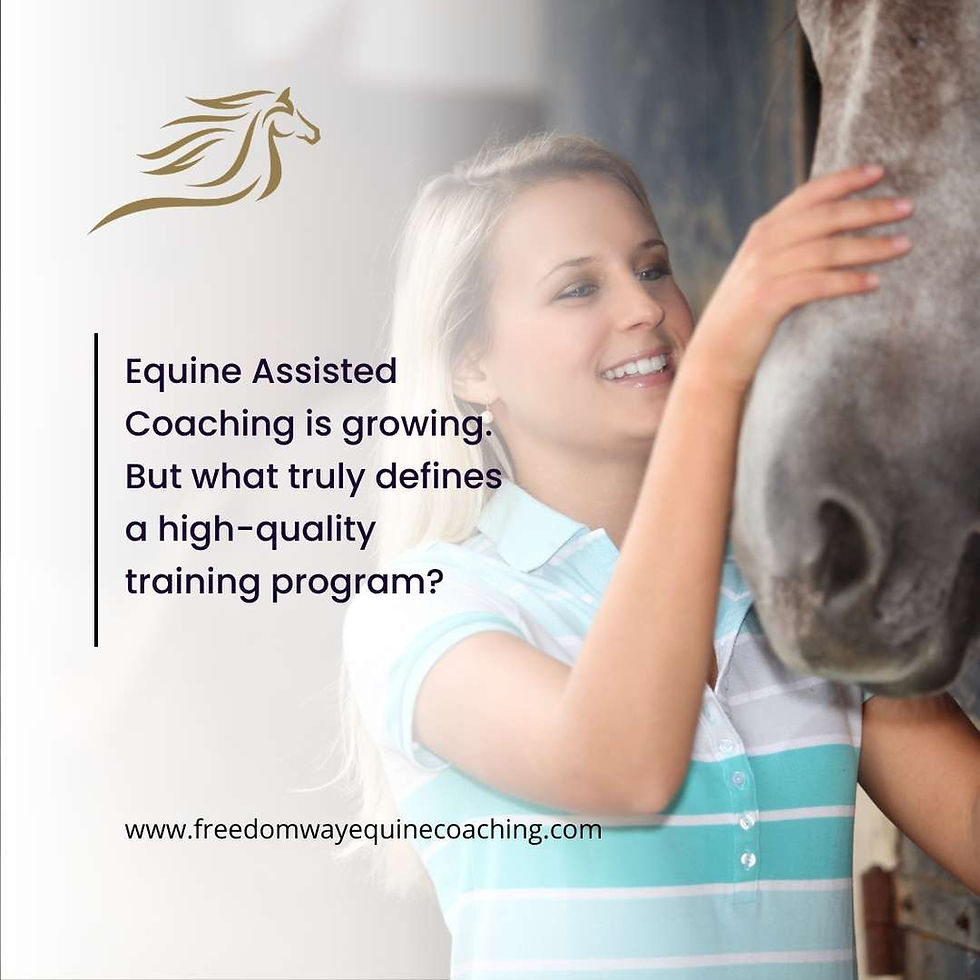Unlocking the Heart's Rhythm in Equine Assisted Coaching
- Diana Gogan

- Feb 1, 2024
- 2 min read
Updated: Aug 5, 2025

In the realm of equine assisted coaching, where the profound connection between humans and horses unfolds, a fascinating aspect comes into play – heart rate variability (HRV). This physiological metric, clarified by the pioneering work of researchers such as Dr. Ellen Gehrke and Dr. Ann Baldwin, takes center stage in the unique and transformative experience of equine assisted coaching sessions. It is truly the hearts rhythm in Equine Assisted Coaching.
Dr. Gehrke and Dr. Baldwin's extensive research on HRV sheds light on its significance as a marker of autonomic nervous system (ANS) flexibility and the body's adaptability to different situations. In equine assisted coaching, the presence of horses adds a dynamic element to the coaching environment. Horses, renowned for their sensitivity to non-verbal cues and emotional states, act as living biofeedback systems, mirroring the emotional and energetic landscape of the participants.
As individuals engage in activities with horses, their emotions, stress levels, and overall well-being, as observed through HRV, become intertwined with the horses' responses. Dr. Gehrke and Dr. Baldwin's research underscores the dynamic interplay between human and horse, emphasizing the horses' role in eliciting positive physiological responses, including an increase in heart rate variability.
Studies inspired by their work have demonstrated that engaging with horses in a coaching setting can indeed lead to an increase of heart rate variability. This increase is associated with a shift towards a more balanced and coherent state of the autonomic nervous system. The soothing presence of horses, highlighted in Dr. Baldwin's research, contributes to a sense of calmness and emotional regulation, further reflected in the enhanced HRV patterns.
Moreover, the non-judgmental and intuitive nature of horses, as illuminated by Dr. Gehrke's work, creates a safe space for participants to explore their emotions and inner thoughts. This emotional exploration, facilitated by the equine partner, aligns with the findings of Dr. Baldwin, leading to a more coherent and harmonious heart rate variability pattern. The positive impact on HRV suggests a potential for improved emotional resilience and coping mechanisms.
Equine assisted coaching sessions, with their focus on experiential learning, align directly with this research. The HRV becomes a valuable tool in sessions, providing real-time feedback on the participant's emotional and physiological responses. Coaches, drawing from the insights of these researchers, can observe changes in HRV to gauge the effectiveness of strategies and tailor the coaching experience accordingly.
The Freedom Way® recognizes and champions the findings of this research, which is why it's at the heart of our Equine Assisted Coach training programs. It's gratifying to understand what is happening beneath the surface of what our coaches witness daily with their clients. We're excited about the transformative potential it unlocks, providing a scientific basis for the remarkable outcomes observed in equine assisted coaching sessions.
The Heartmath® Institute shares more about the findings of Gehrke and Baldwin in this short video.
Heart rate variability emerges as a pivotal element in the intricate dance between humans and horses in equine assisted coaching. The work of Dr. Gehrke and Dr. Baldwin underscores HRV as a biofeedback mechanism, offering tangible insights into the participant's emotional state and the efficacy of coaching interventions. It stands as a testament to the transformative power of equine assisted coaching.




Comments